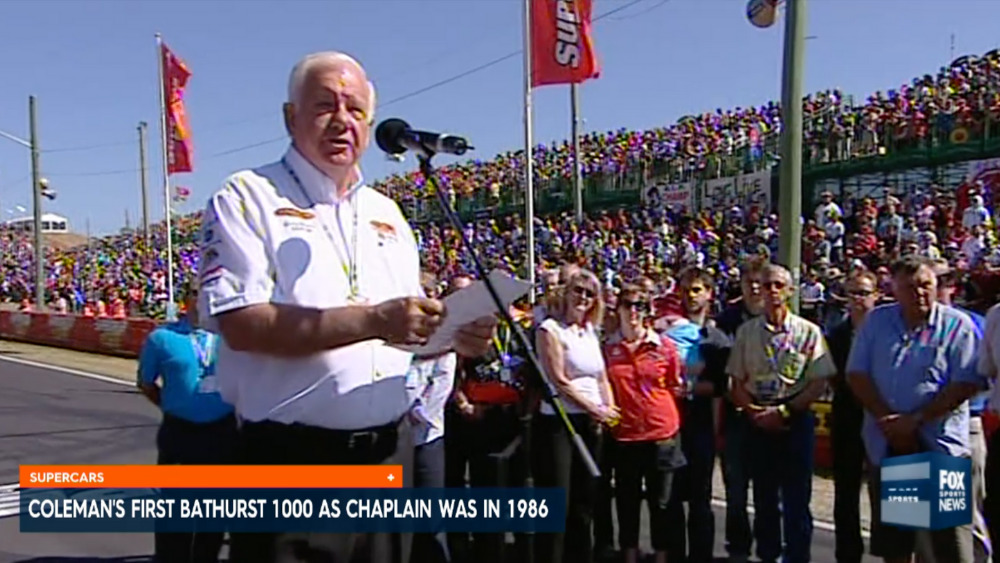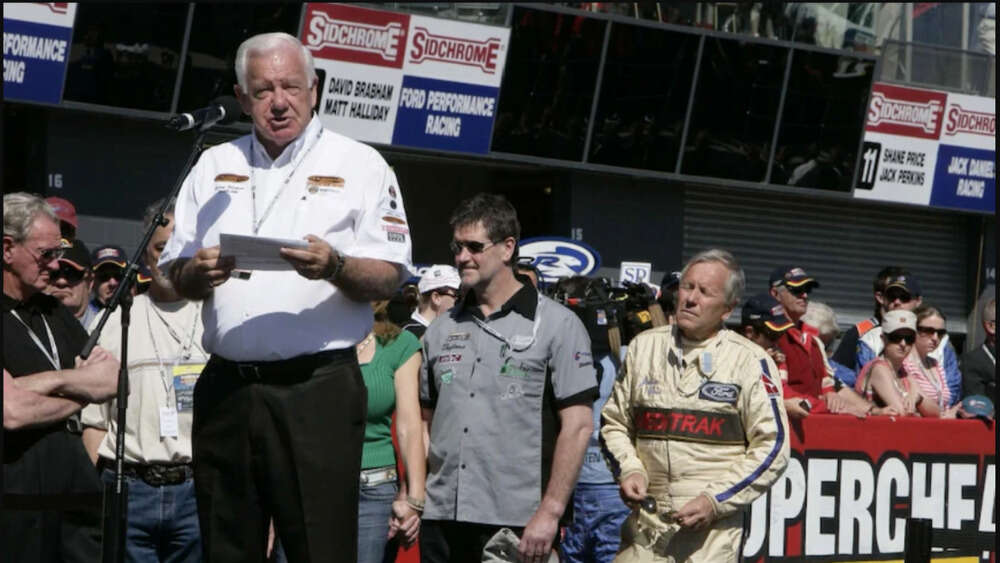The man who introduced Aussie motor racing to prayer
Mount Panorama’s iconic chaplain shifts gears
Once a year, a prayer by Reverend Garrett (Garry) Coleman gets the attention of the whole nation – and even the world.
“I get to pray for 60 seconds on international television at the major sporting event of the year. There is no other sporting event in Australia that does that,” Coleman tells Eternity, having recently enjoyed this honour for the last time.
After 35 years as senior chaplain at the Bathurst 1000 V8 Supercars event, 80-year-old Coleman has decided it’s time to retire – well, from this part of his role at least.
At Coleman’s final Repco Bathurst 1000 – on 5 December, 2021 – he again had the opportunity to engage the Mountain Panorama crowd and all those watching on TV in “talking with God”.
“Often at Bathurst, as this year, almost everybody stands up, almost every cap comes off and people have commented, ‘We can hear the birds in the trees,'” he says.
“Now it’s absolutely amazing in a secularised country like Australia is becoming, that there’s a respect for something there – it’s respect for God, respect for the moment, respect for prayer in our country. And I think it’s because the wording that I use is not church language they don’t understand.”
“… So it became regular not only at Bathurst but at other racetracks around the country to pray before major races.” – Garry Coleman
Coleman speaks the language of racing enthusiasts because cars have always been part of his life. He began his working life as a mechanic and kept an interest in motorsport after moving into vocational ministry. Coleman went on to pastor three churches before becoming the first motorsports chaplain for Sports Chaplaincy Australia (SCA) in 1986.
Since then he has played a key role in developing SCA’s Motor Racing Ministries (MRM) – which now has over 50 chaplains supporting events around Australia. And while he is stepping down from his role as chaplain to the Supercars events circuit, C0leman will continue as national coordinator for MRM. He will also still serve as chaplain to Sydney Motorsport Park and the new Sydney Speedway.
It’s notable that Coleman has never received a wage for his voluntary service as chaplain, although his contribution to the motor racing community was recognised with an Order of Australia Medal in 2010.
Reflecting on the extraordinary opportunities he has had during three decades as Supercars chaplain, Coleman describes how the invitation to pray at the Bathurst 1000 first came about 18 years ago.
“The year after the Bali bombings [in 2002], our [then] prime minister, John Howard, asked that we remember those people who had been affected by and were still coping with that disaster …
“And so I had the opportunity before the [National] Anthem to reflect on, remember and pray for those who had been affected by the Bali bombings. The effect of that was such that they said, ‘Let’s keep doing that’ …
“So it became regular not only at Bathurst but at other racetracks around the country to pray before major races. Still now, many of my Speedway chaplains get to pray every night before the National Anthem.”

Garry Coleman addresses the Bathurst 1000 crowd following Peter Brock’s death in 2006 Screenshot: Fox News
Prayer really hit motor racing’s centre stage when Coleman was invited to give a reflection after the death of Australian motor racing legend – and nine-time Bathurst winner – Peter Brock, who was killed in an accident in September 2006 while taking part in a rally in Western Australia.
Three weeks later, at that year’s Bathurst 1000, Coleman addressed a national audience, but this time for a full three minutes.
“It was not a tribute to Peter Brock, but it was a tribute to a hurting audience because we’d lost two national heroes, Steve Irwin and Peter Brock, within a matter of months. The audience was hurting and [asking] who do I follow now? Who’s my hero? Who’s my role model? So that comment and prayer was crafted for a hurting, national audience, not just to eulogise Peter, whom I’d known reasonably well up until the time of his death.”
Coleman’s address likened the challenges in life to the ups and downs and driving the ‘Esses’ of the Mount Panorama track that “Brockie” had driven so many times. And the response to his message was “amazing”.
“I had journalists for months afterwards asking for a copy of it. In some ways, it was the first time that they had heard a tribute and a prayer together that was practical. And I think that’s the secret … to be able to use phrasing and concepts that people understand,” he says.
Ministry behind the scenes
Aside from public prayers, motor racing chaplains are involved in far more prayer off stage – thanks to the relationships that Coleman and his MRM team have forged with many race event managers.
“Behind the scenes, there’s a lot of other places where chaplains are there to pray. People say, ‘Well, it’s for safety. We ask for any help we can get for the safety of our sport, which is dangerous,'” says Coleman.
“So our rally chaplains get to pray at the drivers’ briefing before the rallies begin. At some of the bike race meetings, the chaplain gets to pray with the drivers at their briefing.
“And let me tell you what happens at Bathurst, Eastern Creek and at other road racing tracks,” he offers.
“At Bathurst this year, we were there for six days and we had chaplains there for all of that time. For four of those six days, our chaplains would pray with five or five groups of people before activity starts for the day.
“We get to pray with all the flag marshals together as a group, with all the fire crew, with all the recovery tow truck driver crew, with all the scrutineers who look after the cars’ technical side of things and with all the people who are in pit lane.
“Most times that’s at the request of those groups, and we’ve been doing that for the best part of 15 years. So the actual ministry at the track is primarily amongst all the officials that make up the volunteers for a race meeting.”
“We do everything the church pastor does except preach.” – Garry Coleman
As well as prayer, motor racing chaplains are involved in lots of pastoral care. This is primarily for all the marshals and officials at the events, as well as for drivers and their families.
“The clerk of the course and the secretary of the meeting look after all the racing and event logistics. But we look after all the people stuff,” says Coleman.
“Of course, when there are incidents on a track, then we’re at the medical centre. We also visit hospitals if they’re taken to hospital, and deal with family and crew. Or with all the officials, we help when they have family problems, such as when Grandad’s got cancer or somebody else is in hospital or somebody is not well.
“So we do all that normal pastoral stuff behind the scenes, as well as on the track. We do everything the church pastor does except preach.”
Many opportunities to pray or provide pastoral care at motor racing events arise by simply “loitering with intent”.
“I tell my chaplains to wander around and just be there when people need you, be at the medical centre, be around and wait to see where God’s going to direct you,” Coleman explains.
“Usually by mid-morning of a race event, we’ve had two or three of those God moments when [you can see] the Lord put me there to talk to that person. And by the end of the day, you know why you’ve been there that day because you’ve seen those God moments of direction – being there to encourage someone or to hear something from them, and to say, ‘I’ll pray for you.’ Or if it’s serious, ‘Let me pray for you right now.’
He adds: “I’ve never had anybody say, ‘Please don’t do that.’ They usually respond with a quiet, ‘Thank you very much.'”
“We are, in a sense, the walking person of Jesus in amongst that crowd …” – Garry Coleman
Other opportunities come because of the close relationships chaplains have forged with teams of officials at different events who have become their “constant congregations”.
“The teams vary from race to race. And so sometimes we see them often. Sometimes we see them once or twice a year,” explains Coleman, who has built “very deep relationships” with many of these people over his 35 years in chaplaincy.
“If some of those people have been to a big crash at the event, then we keep tabs on them afterwards through the chief marshal to make sure that they’ve coped well. Over the years, some of those events pile up. And every now and again, one of those marshals has an emotional flip over the edge where they figure they can’t do their job anymore. So [we] attend to some trauma counselling and get backup assistance for people to help them cope …
“When dealing with emotional things, men are not all that great at asking for help,” Coleman adds, “so sometimes you’ve got to spot them.”
As he steps away from Supercar events to spend more time with his wife, Betty – while continuing to support MRM chaplains and work for a couple of other Christian ministries – Coleman is confident that the tracks are in good hands.
“I’m leaving behind a good team of chaplains at Bathurst and at the other racetracks where Supercars meet,” he says.
And just as God took Coleman from being a “dirty motor mechanic laying under cars to standing up at a microphone”, no doubt he will also use these chaplains to continue to bring his presence to the sport, to Australia and to the world.
“People have often said to others, ‘When Garry’s around it feels different. And when he leaves, it feels so peaceful. He must be a wonderful man,'” shares Coleman.
“But we keep saying, ‘No, that was the Lord. That was the Lord’s presence.’ And as we are, in a sense, the walking person of Jesus in amongst that crowd, it’s his presence that people sense … I hope that may leave people with a curiosity to want to know how you get to know God personally.”
Email This Story
Why not send this to a friend?


